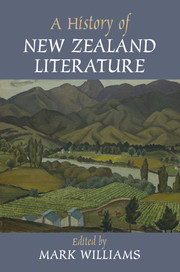Book contents
- Frontmatter
- Contents
- Notes on Contributors
- Acknowledgments
- Introduction
- PART I 1760–1920
- PART II 1920–1950
- PART III 1950–1972
- PART IV 1972–1990
- 16 From Hiruharama to Hataitai: The Domestication of New Zealand Poetry, 1972–1990
- 17 The Novel, the Short Story, and the Rise of a New Reading Public, 1972–1990
- 18 ‘DBed and chocolate wheaten beaten’: Drama Defining the Nation, 1972–1990
- 19 The Māori Renaissance from 1972
- PART V 1990–2014
- Index
18 - ‘DBed and chocolate wheaten beaten’: Drama Defining the Nation, 1972–1990
from PART IV - 1972–1990
Published online by Cambridge University Press: 05 April 2016
- Frontmatter
- Contents
- Notes on Contributors
- Acknowledgments
- Introduction
- PART I 1760–1920
- PART II 1920–1950
- PART III 1950–1972
- PART IV 1972–1990
- 16 From Hiruharama to Hataitai: The Domestication of New Zealand Poetry, 1972–1990
- 17 The Novel, the Short Story, and the Rise of a New Reading Public, 1972–1990
- 18 ‘DBed and chocolate wheaten beaten’: Drama Defining the Nation, 1972–1990
- 19 The Māori Renaissance from 1972
- PART V 1990–2014
- Index
Summary
Roger Hall did not spring upon us, without visible forebears, like Athene from the skull of Zeus, but after some 20 years of gruelling cultivation of an inhospitable cultural desert, our diet, the locusts of public indifference, the honey of modest success…. [W]e have jointly and severally been John the Baptists, precursors, tilling the soil and preparing the ground.
Bruce Mason (1978)The years 1972 through 1990 saw the realisation of Bruce Mason's long-held vision for New Zealand playwriting. As Mason recognises, this period brought unprecedented commercial and critical recognition for New Zealand playwrights, although the groundwork for this success had been laid over the previous decades of largely unrecognised efforts by writers like himself. In the 1970s and 1980s, Roger Hall's local and international box-office success, together with the critical acclaim for Greg McGee's Foreskin's Lament, proved for the first time that playwriting could become a viable career and make a vital contribution to the arts in New Zealand.
This was also the era that saw a new professionalisation of New Zealand theatre. The establishment in 1973 of Playmarket, the national scriptwriters’ agency, gave playwrights for the first time a support body to promote their work. Playmarket's biennial New Zealand Playwrights’ Workshop established in 1980 provided a rigorous structure for script development, with the first workshop yielding Foreskin's Lament. The period saw a network of professional theatres established throughout the country. In 1972, the Arts Council–funded New Zealand Drama School converted from a one-year to a two-year course, signalling an increased commitment to professional theatre training. Although the school's mission at that stage was solely to train actors, several graduates became important playwrights, including Jean Betts, Lorae Parry, Fiona Samuel, David Geary, Hone Kouka, Victor Rodger, and Vela Manusaute.
Prior to 1972, many of the most challenging plays were created by writers working primarily in other literary forms, notably Sargeson, Curnow, Campbell, and Baxter. The dedicated playwright, such as Mason, was an isolated phenomenon. After the widespread recognition of Hall and McGee, however, there was a remarkable shift towards a body of playwrights for whom drama was their primary activity and income source.
- Type
- Chapter
- Information
- A History of New Zealand Literature , pp. 262 - 276Publisher: Cambridge University PressPrint publication year: 2016



